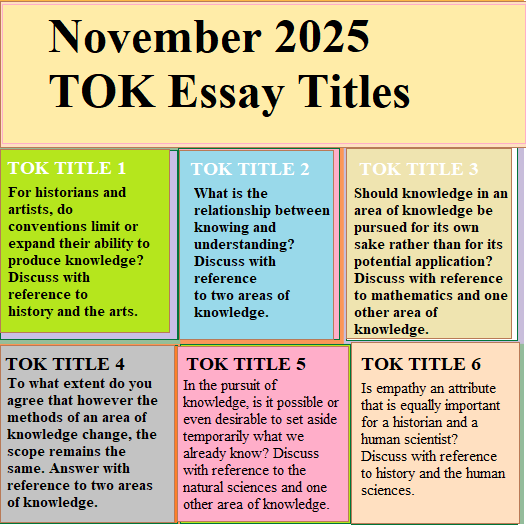The November 2025 TOK essay titles invite students to explore complex questions about knowledge, its applications, and its limitations across different areas of expertise (AOKs). Each title requires critical thinking, engagement with diverse perspectives, and well-supported arguments. Let us briefly analyze each title to help students confidently begin their TOK journey.
November 2025 TOK Essay Titles
1. For historians and artists, do conventions limit or expand their ability to produce knowledge? Discuss with reference to history and the arts.
2. What is the relationship between knowing and understanding? Discuss with reference to two areas of knowledge.
3. Should knowledge in an area of knowledge be pursued for its own sake rather than for its potential application? Discuss with reference to mathematics and one other area of knowledge.
4. To what extent do you agree that however the methods of an area of knowledge change, the scope remains the same. Answer with reference to two areas of knowledge.
5. In the pursuit of knowledge, is it possible or even desirable to set aside temporarily what we already know? Discuss with reference to the natural sciences and one other area of knowledge.
6. Is empathy an attribute that is equally important for a historian and a human scientist? Discuss with reference to history and the human sciences.

TOK essay titles for November 2025 Description
Title 1: For historians and artists, do conventions limit or expand their ability to produce knowledge? Discuss with reference to history and the arts.
This question explores the role of conventions, established rules, methods, and traditions in shaping knowledge production in history and the arts. While conventions provide structure and credibility, they can also restrict innovation. Historians rely on established methodologies, such as source evaluation and historiography, while artists often break conventions to create groundbreaking work. The essay should examine whether these conventions ultimately aid or hinder the development of new knowledge.
Title 2: What is the relationship between knowing and understanding? Discuss with reference to two areas of knowledge.
This title invites students to differentiate between knowing (having information) and understanding (comprehending and applying information meaningfully). The distinction is particularly relevant in AOKs like natural sciences, where memorizing formulas differs from grasping underlying concepts, and ethics, where understanding moral frameworks goes beyond simply knowing ethical rules.
Title 3: Should knowledge in an area of knowledge be pursued for its own sake rather than for its potential application? Discuss with reference to mathematics and one other area of knowledge.
This question explores the intrinsic versus instrumental value of knowledge. Often considered a pure pursuit, mathematics has applications in engineering and physics. Comparing mathematics with other AOKs, such as history or natural sciences, can highlight different perspectives on whether knowledge should be sought purely for curiosity or its real-world benefits.
Title 4: To what extent do you agree that, however, the methods of an area of knowledge change, the scope remains the same? The answer concerns two areas of knowledge.
This title requires an analysis of whether changes in methodologies, such as technological advancements in natural sciences or shifts in research techniques in history, alter the overall scope of knowledge production. For instance, while scientific methods evolve, the scope of natural sciences remains focused on explaining the natural world. However, some may argue that changing methods lead to expanding the scope itself.
Title 5: In the pursuit of knowledge, is it possible or even desirable to set aside temporarily what we already know? Discuss with reference to the natural sciences and one other area of knowledge.
This title challenges students to consider whether suspending prior knowledge is necessary for acquiring new insights. In natural sciences, paradigm shifts (e.g., Einstein’s relativity replacing Newtonian physics) sometimes require disregarding established knowledge. Similarly, in ethics, shifting societal norms might demand questioning previous moral beliefs. The essay should evaluate the feasibility and desirability of such temporary suspensions.
Title 6: Is empathy an attribute that is equally important for a historian and a human scientist? Discuss with reference to history and the human sciences.
This question explores the role of empathy in understanding human behaviour and events. Historians benefit from empathy to interpret past actions without imposing present-day biases, while human scientists use it to study contemporary social issues. However, does one AOK require empathy more than the other? The essay should examine whether objectivity and analytical detachment coexist with empathetic understanding in both disciplines.
Check also on May 2025 TOK essay titles
Conclusion
The November 2025 TOK essay titles present students with challenging yet engaging inquiries into the nature and production of knowledge. Whether exploring the role of conventions, the pursuit of knowledge for its own sake, or the necessity of empathy, each title encourages deep reflection and well-supported arguments.
Success in the TOK essay lies in balancing personal engagement, real-world examples, and critical analysis. By carefully dissecting these questions, students can craft insightful essays that contribute meaningfully to the discourse on knowledge and its significance.









 Evan John
Evan John